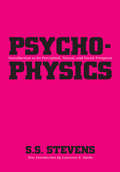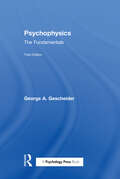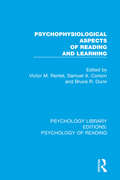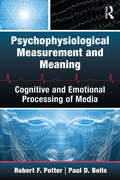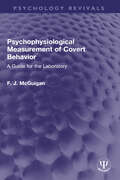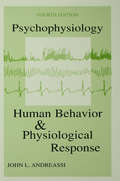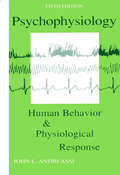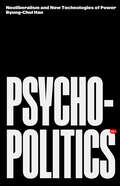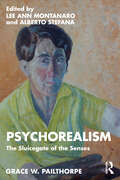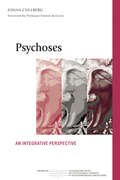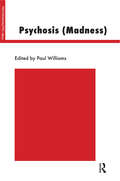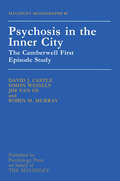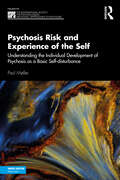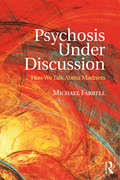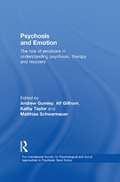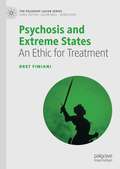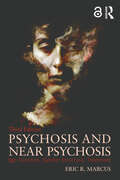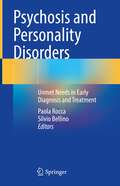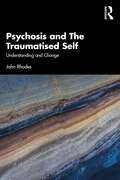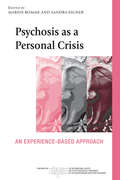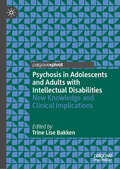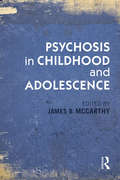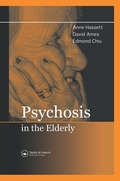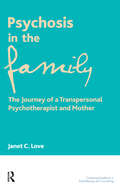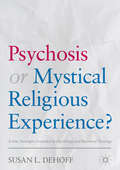- Table View
- List View
Psychophysics: Introduction to Its Perceptual, Neural and Social Prospects
by S.S. StevensPsychophysics is a lively account by one of experimental psychology's seminal figures of his lifelong scientific quest for general laws governing human behavior. It is a landmark work that captures the fundamental themes of Stevens's experimental research and his vision of what psycho-physics and psychology are and can be. The context of this modern classic is detailed by Lawrence Marks's pungent and highly revealing introduction. The search for a general psychophysical law—a mathematical equation relating sensation to stimulus—pervades this work, first published in 1975. Stevens covers methods of measuring human psychophysical behavior: magnitude estimation, magnitude production, and cross-modality matching are used to examine sensory mechanisms, perceptual processes, and social consensus. The wisdom in this volume lies in its exposition of an approach that can apply generally to the study of human behavior
Psychophysics: The Fundamentals
by George A. GescheiderThis third edition of a classic text which was first published in 1976 is the only comprehensive, up-to-date presentation of psychophysics currently available. It has been used by undergraduate and graduate students, and scholars throughout the world and is consistently thought of as the best single source for learning the basic principles of psychophysics. The coverage of the field is comprehensive, including topics ranging from the classical methods of threshold measurement, to the modern methods of detection theory, to psychophysical scaling of sensation magnitude. The approach is one in which methods, theories, and applications are described for each experimental procedure. New features found in this third edition include: * methodological and theoretical contributions made in the field during this time period, * descriptions of adaptive procedures for measuring thresholds, context effects in scaling, theory of quantal fluctuations, multidimensional scaling, nonmetric scaling of sensory differences, and the relationship between the size of the DL and the slope of the sensation magnitude function, * new methods for measuring the observer's sensitivity of criterion and an expanded discussion of category scaling including the range frequency model and verbally labeled categories, and * methods used to control the observer's nonlinear use of numbers in magnitude estimation such as line-length scaling, magnitude matching, master scaling, and category-ratio scaling.
Psychophysiological Aspects of Reading and Learning (Psychology Library Editions: Psychology of Reading #9)
by Victor M. RentelBringing together neurological assessments of reading and cognition, this provocative volume, originally published in 1985, presents eight major and sometimes controversial studies on the parts and patterns of the reading process. With comprehensive coverage ranging from psycholinguistics and education to neurophysiology, these studies highlight new directions in the field at the time. The contributors support an interactive rather than dichotomous model of brain function, and stress individual differences in assessing reading and cognitive skills.
Psychophysiological Measurement and Meaning: Cognitive and Emotional Processing of Media (Routledge Communication Series)
by Robert F. Potter Paul BollsThis research volume serves as a comprehensive resource for psychophysiological research on media responses. It addresses the theoretical underpinnings, methodological techniques, and most recent research in this area. It goes beyond current volumes by placing the research techniques within a context of communication processes and effects as a field, and demonstrating how the real-time measurement of physiological responses enhances and complements more traditional measures of psychological effects from media. This volume introduces readers to the theoretical assumptions of psychophysiology as well as the operational details of collecting psychophysiological data. In addition to discussing specific measures, it includes brief reviews of recent experiments that have used psychophysiological measures to study how the brain processes media. It will serve as a valuable reference for media researchers utilizing these methodologies, or for other researchers needing to understand the theories, history, and methods of psychophysiological research.
Psychophysiological Measurement of Covert Behavior: A Guide for the Laboratory (Psychology Revivals)
by F. J. McGuiganBy the 1970s psychology had made sizable advances with its primary emphasis on the study of overt behavior, but its progress on covert behavior had been delayed because of the lack of suitable psychophysiological technology. Originally published in 1979, this title was written to help laboratory researchers in their efforts to develop a mature science of covert behavior. Early efforts to record small-scale behavior with flattened wine glasses about the tongue were heroic, but understandably progress did not begin until the advent of very sensitive electronic equipment. In 1979 we were now technologically capable of: (1) sensing; (2) amplifying; (3) recording; and (4) quantifying small-scale behavior with at least the effectiveness with which we have studied large-scale responses. It was hoped that this book would facilitate the empirical efforts of future psychophysiologists and professional researchers in each of these four phases of the laboratory system. More generally it was hoped that it would serve as an important component in our efforts to understand behavior. Today it can be read in its historical context.
Psychophysiology: Human Behavior & Physiological Response
by John L. AndreassiThis highly readable and comprehensive overview of psychophysiology provides information regarding the anatomy and physiology of various body systems, methods of recording their activity, and ways in which these measures relate to human behavior. Biofeedback applications are contained in a separate chapter and discussions of stress management, job strain, and personality factors that affect cardiovascular reactivity are presented. There is much of interest here to the student, researcher, and clinician in behavioral medicine, ergonomics, emotion, cognitive neuroscience, neuropsychology, and health psychology. Now in its fourth edition, Andreassi's Psychophysiology explores some of the newer areas of importance and updates findings in traditional topics of interest. Significant changes to this edition include: updated information on brain activity in memory, perception, and intelligence; new information on brain imaging and behavior; separate chapters on pupillography and eye movements; new information on the startle pattern and eyeblink; separate chapters on clinical and non-clinical applications; updated information on cardiovascular reactivity and personality; the latest biofeedback and ergonomics applications; novel findings in environmental psychophysiology; brief summaries at the end of each section; and an appendix on laboratory safety Each chapter is a self-contained unit allowing instructors to customize the presentation of the material. With over 1,700 citations, Andreassi's Psychophysiology is the definitive text in the field. An instructor's manual is now available. Based on the book, the manual is primarily a test bank to be used in giving examinations to students during the teaching of a course. Both multiple-choice and essay questions have been provided, along with lists of key terms and ideas. These can be used for definition-type questions and to highlight important concepts, as well as alerting the instructor to important terms and ideas that they may want to cover in lectures. Sample syllabi are provided for teaching a course at both undergraduate and graduate levels to help the instructor who is preparing a course for the first time. A number of possible laboratory exercises are also provided that can be carried out in conjunction with teaching the course.
Psychophysiology: Human Behavior and Physiological Response
by John L. AndreassiAs new technology fuels the rapid growth of research in psychophysiology, it is essential that those new to the field receive a comprehensive introduction. Psychophysiology: Human Behavior and Physiological Response provides students with elementary information regarding the anatomy and physiology of various body systems, recording techniques, integrative reviews of literature, and concepts in the field. Highly accessible, this book fills a gap between edited handbooks that are often difficult for beginners, and journal articles that may also be a challenge to digest. In this new edition, John L. Andreassi incorporates:*a glossary of terms at the end of each chapter to help students learn definitions of novel terms introduced throughout the book;*a new chapter focusing on the proliferation of neuroimaging studies, including positron emission tomography (PET) and functional magnetic resonance imaging (fMRI); and*content changes in all chapters to cover new areas of research, as well as to update findings in traditional topics of interest. Upper level undergraduate and beginning graduate students in psychophysiology, biological psychology, cognitive neuroscience, and physiological psychology will benefit immensely from this important text, just as professionals new to psychophysiology will find this book exceptionally useful in their work.
Psychopolitics: Neoliberalism and New Technologies of Power (Futures)
by Byung-Chul HanExploring how neoliberalism has discovered the productive force of the psycheByung-Chul Han, a star of German philosophy, continues his passionate critique of neoliberalism, trenchantly describing a regime of technological domination that, in contrast to Foucault&’s biopower, has discovered the productive force of the psyche. In the course of discussing all the facets of neoliberal psychopolitics fueling our contemporary crisis of freedom, Han elaborates an analytical framework that provides an original theory of Big Data and a lucid phenomenology of emotion. But this provocative essay proposes counter models too, presenting a wealth of ideas and surprising alternatives at every turn.
Psychorealism: The Sluicegate of the Senses
by Grace W. PailthorpeThis book brings Grace Pailthorpe’s previously unpublished work to readers for the very first time and explores the profound impact of early childhood development on one’s psychological well-being. Through her innovative concept of psychorealism, Pailthorpe offers a unique blend of art and psychoanalysis aimed at understanding and balancing the human psyche.The book delves into the mechanisms by which infants develop fundamental psychological patterns. Pailthorpe argues that understanding these early developmental stages is crucial for addressing psychological imbalances. Psychorealism, as she defines it, involves creating art free from conscious interference, allowing for the pure expression of psychic realities. This form of automatic creativity offers fresh insights into the symbolic essence of the psyche and its influence on human behaviour. By analysing psychorealistic art, Pailthorpe illuminates the complex facets of human behaviour and provides a novel perspective on the interplay between the unconscious mind and artistic expression. Pailthorpe’s research stands out for its originality and practical application. Her work not only enriches the field of psychoanalysis but also provides valuable tools for therapeutic practices.This book is particularly useful for psychologists, art therapists, and scholars interested in the intersections of art and psychology, offering new methods for understanding and treating psychological issues through creative expression. This approach will also appeal to general readers, librarians, and booksellers with its intriguing integration of art and psychology.
Psychoses: An Integrative Perspective (The International Society for Psychological and Social Approaches to Psychosis Book Series)
by Johan CullbergPsychoses provides a unique perspective on the challenges associated with understanding and treating psychoses, bringing together insights and developments from medicine and psychology to give a full and balanced overview of the subject. Johan Cullberg draws on his extensive experience working with those suffering from first-episode psychosis to investigate issues including vulnerability factors, phases of psychosis, prevention, the potential for recovery and contemporary attitudes to psychosis. Particular attention is paid to how therapeutic interventions can either support or obstruct the ‘self-healing’ properties of many psychoses. This sensitive and humane perspective on the nature and treatment of psychoses will be of interest to all mental health professionals interested in increasing their understanding and awareness of this subject.
Psychosis (The\psychoanalytic Ideas Ser.)
by Paul WilliamsIn this volume a number of British psychoanalysts introduce us to psychoanlaytic definitions of intra-psychic and subjective meaning in patients suffering psychotic conditions. Irrespective of the particular type of psychotic illness under consideration of the context or treatment, each paper illustrates how the psychoanalytic clinician searches to establish meaning from events which are highly complex and often overwhelmingly confusing.Contributors: "Psychosis and violence" Leslie Sohn; "Sorrow, Vulnerability and Madness", Michael Conran; "How Can You Keep Your Hair On?", Michael Sinason; "The Delusions of the Non-Remitting Schizophrenias - Parallels with Childhood Phantasies", Thomas Freeman; "Managing Psychotic Patients in a Day Hospital Setting", Richard Lucas; "Desctructive Narcissism" and "The Singing Detective", David Bell.
Psychosis In The Inner City: The Camberwell First Episode Study (Maudsley Series #No.40)
by David J. Castle Robin M. Murray Simon Wessely Jim Van OsThe "epigenetic puzzle" which is schizophrenia, forms the focus of this Monograph, But The Authors Do Not Sit Comfortably With The Notion That this is an entity. Rather, they approach the non-affective psychoses on a broad epidemiological base, ascertaining cases of so-called "functional" psychoses over a quarter of a century. They examine admission policies, showing that patients are admitted to hospital on the grounds of their particular presentation, rather than their diagnosis. They explore Differences Between Males And Females With Psychotic Disorders, And Show that gender is a more powerful influence than diagnosis. They investigate trends over time, and find that demography is the major influence. Looking at criminality, they show that the factors predicting criminal Behaviour In Individuals With Psychotic Illness Are Much The Same In those without psychotic illness. And they trace the longitudinal course of illness, putting paid to the schizophrenia/manic depression dichotomy.; This monograph is an overview of the ideas and many of the findings generated by a highly productive group of researchers. It has a good chance to become one of the standard references in several of the key aspects of schizophrenia.
Psychosis Risk and Experience of the Self: Understanding the Individual Development of Psychosis as a Basic Self-disturbance (The International Society for Psychological and Social Approaches to Psychosis Book Series)
by Paul MøllerMøller sheds light on the inner aspects of psychosis and psychosis risk, and its core experiential phenomena as a method of understanding the individual early psychosis development.The book details how such experiences might take shape in the human mind and how a better understanding achieved through detailed clinical conversations can lead to earlier detection and improved interventions. Møller also outlines the subjectivity model (also called Ipseity Disturbance Model) and presents a broad review of different treatment approaches and settings, in which work with disturbed self-experience could be integrated, including psychotherapy, in-patient milieu therapy, supportive treatments, psychoeducational family work, local networking, and medication. Psychosis Risk and Experience of the Self will prove essential for experienced and specialised clinicians as well as the more generally interested reader.
Psychosis Under Discussion: How We Talk About Madness
by Michael FarrellPsychosis Under Discussion: How We Talk About Madness examines the ways in which psychosis is discussed by considering the relationship between language and the perception of mental disorder. A wide range of perspectives is discussed – including historical terms, personal accounts, psychiatric terminology, psychoanalysis and later theoretical analyses, advocacy, anti-psychiatry, slang and humour, and media coverage – and each way of discussing psychosis is revealing. For example, psychiatric terminology and related research, in its efforts to understand and clarify can seem distancing, dispassionate, and too sure of its ground, whereas the language of advocacy, while being supportive and sensitive, can also seem euphemistic and evasive. In the discourse of mental disorder, both the content of views and the manner in which they are expressed are influential, making it important to take into account both. Psychosis Under Discussion puts these and other important issues under the microscope. International in range, the book’s analysis draws on psychiatry, psychology, philosophy, linguistics and history. Written in Michael Farrell’s well-known clear and direct style, the book is essential reading for all those interested in understanding mental disorder and the role of language.
Psychosis and Emotion: The role of emotions in understanding psychosis, therapy and recovery (The International Society for Psychological and Social Approaches to Psychosis Book Series)
by Andrew Gumley Matthias Schwannauer Alf Gillham Kathy TaylorThere is increasing recognition that emotional distress plays a significant part in the onset of psychosis, the experience of psychosis itself and in the unfolding of recovery that follows. This book brings together leading international experts to explore the role of emotion and emotion regulation in the development and recovery from psychosis. Psychosis and Emotion offers extensive clinical material and cutting-edge research with a focus on: the diverse theoretical perspectives on the importance of emotion in psychosis the interpersonal, systemic and organisational context of recovery from psychosis and the implications for emotional distress the implications of specific perspectives for promoting recovery from psychosis With thorough coverage of contemporary thinking, including psychoanalytic, cognitive, developmental, evolutionary and neurobiological, this book will be a valuable resource to clinicians and psychological therapists working in the field.
Psychosis and Extreme States: An Ethic for Treatment (The Palgrave Lacan Series)
by Bret Fimiani“This brilliant and beautifully written book invokes a radical reorientation of the treatment of psychosis” Juliet Flower MacCannell, Author of Figuring Lacan and The Hysteric’s Guide to the Future Female Subject. “Bret Fimiani's book offers an illuminating presentation of the Lacanian approach to psychosis thanks to his clear style which presents Lacanian concepts with a wonderful accuracy, illustrated by examples from his psychoanalytic practice. The dynamic of his investigation challenges the fear of psychosis with testimonies of lived experiences, the Hearing Voices Network, and analysts who claim the unclaimed intelligence at work in psychosis." Francoise Davoine, co-author of History Beyond Trauma This book advances a theory of transference-in-psychosis with the aim of provoking a change in the way the experience of psychosis is understood and thus, clinically treated. It examines the function of ‘ethics’ in the ‘installation’ of transference in the treatment of psychosis and contends that the aim of the psychoanalytic experience is the creation of a new ethic for the analysand and for the treatment. Beginning from the premise that the body of the psychotic is a site of social contestation, the author draws upon the work of Freud, Lacan, Deleuze & Guattari and Apollon to reframe the problem of the ‘body’ (as an effect of language) and its relation to transference, and ethics, in treating psychosis. It argues that psychosis still has much to teach psychoanalysis about how psychoanalysis must continue to change in order to create/offer an approach that is effective for psychosis (versus neurosis) and provides a comprehensive psychoanalytic theory of psychosis that derives, at its core, from the experience of psychosis itself. The book’s synthesis of clinical and ‘peer model’ principles will provide readers with a way to understand and navigate potential transference impasses often encountered with purely clinical approaches. In doing so it provides a valuable new framework for practitioners and scholars working in clinical psychology, psychoanalysis, philosophy, critical theory, psychiatry and social work.
Psychosis and Near Psychosis: Ego Function, Symbol Structure, Treatment
by Eric MarcusThe goal of psychotherapy as formulated in this revision of a classic text is to improve ego function of severely disturbed patients who are often hospitalized. This book shows why and how. It describes the psychotherapeutic techniques that aid patients to understand the meaning of the psychotic symbols so that they can experience reality and their emotions as separate entities. Medication effects and the neurobiology of psychotic and near psychotic patients are explained and evaluated in terms of specific ego dysfunction so that psychopharmacology may be targeted. With the first edition originally a recipient of the prestigious Heinz Hartmann Award, this valuable resource is a go-to guide for clinicians who treat patients suffering from crippling mental disorders.The Open Access version of this book, available at http://www.taylorfrancis.com, has been made available under a Creative Commons [Attribution-Non Commercial-No Derivatives (CC-BY-ND)] 4.0 license.
Psychosis and Personality Disorders: Unmet Needs in Early Diagnosis and Treatment
by Paola Rocca Silvio BellinoThis volume offers a detailed and up-to-date analysis of the unmet needs of patients with psychoses and personality disorders. These include the needs associated with early detection of ultra-high-risk populations and first-episode psychosis; recognition of the trajectories of bipolar disorder and schizophrenia, recovery, early intervention, such as the use of LAIs, the conundrum of differential diagnosis in various personality disorders, and unsatisfactory quality of life, even in the presence of symptom control.Intended for clinical psychiatrists and other practitioners interested in mental health, this book helps them to manage the challenges of the diagnostic uncertainty in first-episode psychosis and timely interventions, since the earlier diagnosis is confirmed, the sooner multidisciplinary treatment can be implemented and plans for psychoeducation, and relapse prevention drawn up.
Psychosis and The Traumatised Self: Understanding and Change
by John RhodesPsychosis and the Traumatised Self explores what it is like to experience psychosis for individuals with histories of childhood physical and sexual abuse. The book additionally explores how meaning expressed in psychosis might originate from the effects of abuse, but also long-term life difficulties, motivations, memories, social history, and struggles to narrate and understand. One chapter focuses on refugees who suffered trauma as adults and later became psychotic. Another chapter examines how trauma leads to the destruction of certainty and trust, thereby opening a pathway to persecutory ideas. Drawing on a developmental model of trauma, it is proposed that dissociated parts of the self that developed during childhood contribute to psychosis in adults when undergoing difficulties and stress. Presented with case illustrations, the book will be useful for those who work in the area of psychosis and abuse to understand the experiences of individuals, and how we might develop appropriate therapy and care.
Psychosis as a Personal Crisis: An Experience-Based Approach (The International Society for Psychological and Social Approaches to Psychosis Book Series)
by Marius Romme Sandra EscherPsychosis as a Personal Crisis seeks to challenge the way people who hear voices are both viewed and treated. This book emphasises the individual variation between people who suffer from psychosis and puts forward the idea that hearing voices is not in itself a sign of mental illness. In this book the editors bring together an international range of expert contributors, who in their daily work, their research or their personal acquaintance, focus on the personal experience of psychosis. Further topics of discussion include: accepting and making sense of hearing voices the relation between trauma and paranoia the limitations of contemporary psychiatry the process of recovery. This book will be essential reading for all mental health professionals, in particular those wanting to learn more about the development of the hearing voices movement and applying these ideas to better understanding those in the voice hearing community.
Psychosis in Adolescents and Adults with Intellectual Disabilities: New Knowledge and Clinical Implications
by Trine Lise BakkenThis book provides an overview of the characteristics of psychosis and psychotic symptoms, as well as treatment and interventions, in adolescents and adults with intellectual disabilities. It guides readers to understand key principles in diagnostic assessment, differential diagnostics, and treatment by examining the manifestations of psychotic symptoms and providing diagnostic tools and checklists. The research history and phenomenology of the symptoms is complemented with a discussion of the most common diagnostic challenges: is it psychosis, or autism spectrum disorder, PTSD, OCD, anxiety, or physical or neurological disorders, or physical pain? This accessible volume includes perspectives on developmental, behavioural, emotional, and language impairments, and the importance of these factors in establishing adequate therapy. Combination therapy of antipsychotics and psychosocial interventions is also discussed, including psychotherapy, psychoeducation, group therapy, and multifamily groups. Drawing on research-based practice, the authors present several treatment settings to support people with intellectual disabilities and their families, as well as specialist in- and outpatient mental health services, habilitation services, and community services. This is an invaluable resource for students, clinicians, service providers, users, and families involved in the clinical care for people with intellectual disabilities and concurrent psychosis.
Psychosis in Childhood and Adolescence
by James B. McCarthyPsychosis in Childhood and Adolescence offers an in-depth examination of the nature of psychosis, its risk factors and its manifestations in children and adolescents who experience a continuum of emotional disorders. The chapters present a hopeful, research-based framework for treatment. They emphasize combined treatment that is based on psychodynamic and cognitive behavioral psychotherapy principles, pharmacological interventions and supportive family approaches that reflect the vulnerabilities and resources of the individual child. This text highlights the importance of thorough assessment and the need for long-term treatment that facilitates the psychotic child’s healthy maturation. Readers will benefit from the case examples that illustrate the complexity of psychosis and the discussions of diagnostic and treatment issues as presented by experienced clinicians and researchers.
Psychosis in the Elderly
by David Ames Anne M. Hassett Edmond ChiuAcross the spectrum of psychopathology in later life, psychotic symptomatology has been the most neglected, and although literature in this area is increasing, this is the first book to address the need for an overarching framework to examine and understand late-life psychotic phenomena. Exploring the practical and ethical issues that arise when ma
Psychosis in the Family: The Journey of a Transpersonal Psychotherapist and Mother (The\united Kingdom Council For Psychotherapy Ser.)
by Janet C. LoveThis is a book written not just by a professional transpersonal psychotherapist but by someone who has walked the heart-rending path and experienced the psychological trauma of loving someone in psychosis; psychosis which still remains the greatest taboo in society today, together with its implicit diagnosis of a lifelong sentence of medication and no cure. It is in the main a personal and moving narrative of a mother looking to help her son avoid such a lifelong sentence of medication whilst trying to research holistic resources and alternative approaches for treatment at the same time as negotiating the vagaries of the current mental health system. It is often a tale of despair and frustration, yet also gives a compassionate voice. Transpersonal and transgenerational psychotherapeutic insights back up the personal narrative. It includes an accessible inquiry into how unconscious forces influence our mind, our bodies and the entire family system. Its hypothesis is that if we cannot understand our own unconscious responses how can we understand those of our loved ones in psychotic episodes?
Psychosis or Mystical Religious Experience?
by Susan L. DeHoffThis book presents a new paradigm for distinguishing psychotic and mystical religious experiences. In order to explore how Presbyterian pastors differentiate such events, Susan L. DeHoff draws from Reformed theology, psychological theory, and robust qualitative research. Following a conversation among multidisciplinary voices, she presents a new paradigm considering the similarities, differences, and possible overlap of psychotic and mystical religious experiences.
